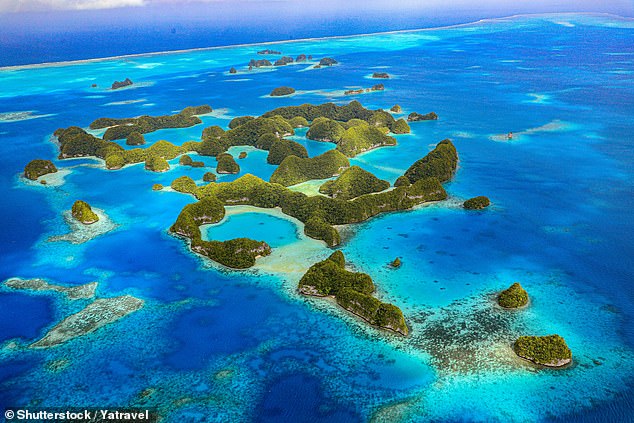Tucked in the Western Pacific lays a country made up of more than 300 islands with pristine turquoise waters and dense jungle.
Located north of Indonesia and west of the Philippines, the Republic of Palau has been at the forefront of eco-tourism for decades.
Despite being a small island nation, Palau became the first in the world to have adopted in 1981 a constitution banning nuclear weapons and created the world’s first shark sanctuary in 2009, banning all commercial shark fishing in its waters.
Between 2014 and 2015, the country experienced a rapid tourism boom, particularly with mass tourism from China, when annual visitor numbers reached a record 170,000.
While Palauan culture values hospitality and treating visitors with respect, locals could see how under-educated visitors were eroding their environment.
This period saw a dramatic increase in tourism that overwhelmed the islands, leading to concerns and a subsequent policy shift in 2015 towards a more sustainable, high-value, low-impact tourism model under the ‘Pristine Paradise Palau’ strategy.
Pacific island countries are among the most vulnerable in the world to the climate crisis and there is concern that the low-lying islands could be badly affected by rising sea levels.
The Palau Pledge was implemented in December 2017, which requires visitors to sign a pledge stamp in their passports that promises the children of Palau that they will ‘tread lightly’ and ‘preserve and protect’ the islands – the first such immigration policy in the world.

Located north of Indonesia and west of the Philippines, the Republic of Palau has been at the forefront of eco-tourism for decades

Despite being a small island nation, Palau became the first in the world to have adopted in 1981 a constitution banning nuclear weapons and created the world’s first shark sanctuary in 2009, banning all commercial shark fishing in its waters
The pledge has inspired other policy changes, such as the ban on reef-toxic sunscreens and the creation of Green Fees to fund conservation.
It has also served as a pioneering model, encouraging other countries to adopt similar initiatives and promote responsible tourism.
Across the Pacific, new tourism models are emerging.
Vanuatu and Cook Islands are promoting ‘regenerative’ tourism while French Polynesia pushes a ‘slow’ tourism model.
Bora Bora, an island within the French territory, has put limits on arrivals to preserve its way of life.
As an economy that relies heavily on tourism, Palau was severely impacted by Covid lockdowns, like many of the Pacific Islands.
Prior to 2020, Palau welcomed an average of 118,000 visitors a year, with tourism the main contributor to the economy.
But after Covid brought the country’s tourism industry to a standstill, thousands of its 18,000 residents were left unemployed with diminished incomes.

Prior to 2020, Palau welcomed an average of 118,000 visitors a year, with tourism the main contributor to the economy

A map shows Palau’s location in the Western Pacific
The country opened back up in April 2022 to fully vaccinated travellers with a focus to attract more Australian visitors.
Despite its proximity, previously tourists were required to catch several connecting flights to get to Palau with the overall travel time taking as long as 20 hours.
Qantas has drastically slashed it after launching a new direct flight from Brisbane in December: the plane ride now only takes around six hours.
Many visitors to Palau come from Taiwan, with which Palau has diplomatic ties.
There is no shortage of things for tourists to do with paddle boarding, hiking, scuba diving and swimming with stingless jellyfish all popular activities.
Snorkelling is a must-do with Neco Marine offering an immersive tour around the Rock Islands – an UNESCO World Heritage Site.
The island nation is a proud matriarchal society and has a rich history that can be discovered on a day out on a traditional boat.
And it seems the country is becoming an increasingly popular destination for a younger generation of travelers with dozens of TikTok videos appearing under a search for Palau.

One video , which has been viewed more than 1.7million times, describes the group of islands as ‘the most beautiful country in the world’

‘This is a country so beautiful you have to sign a pledge on arrival to protect it,’ says one TikTok account, who has documented her travels
One video, which has been viewed more than 1.7million times, describes the group of islands as ‘the most beautiful country in the world’.
‘It’s truly an underwater jungle filled with sharks, turtles, mantas and thousands of species of fish,’ said the creator.
‘Palau isn’t just a place you visit, it’s a place that asks you to respect it. And once you go to Palau you will want to do that.
‘Add this to your bucket list, but only if you’re willing to protect it.’
This article was originally published by a www.dailymail.co.uk . Read the Original article here. .

